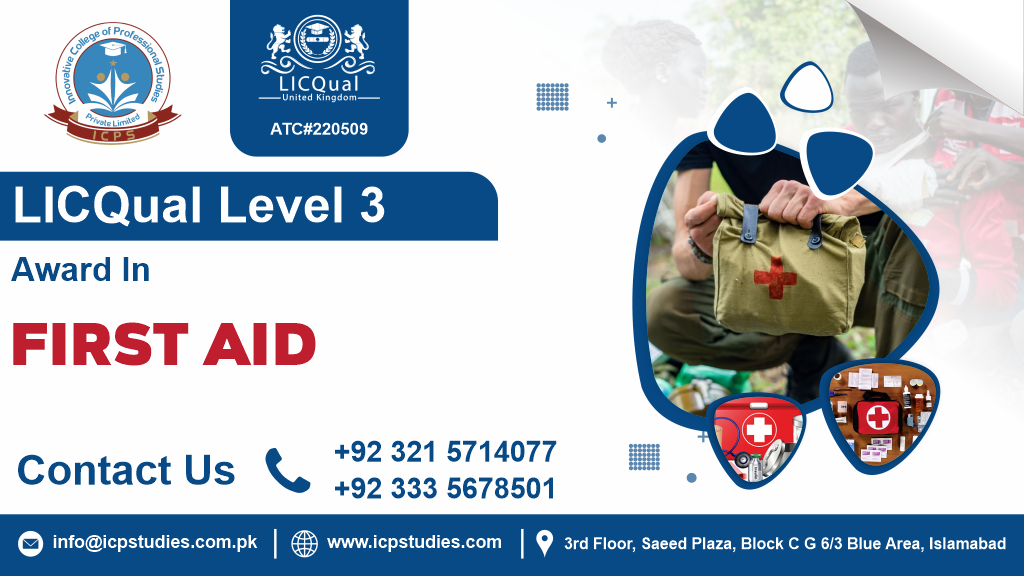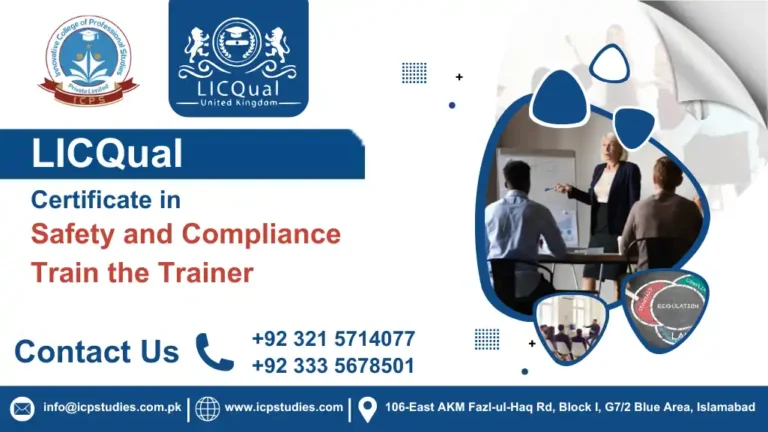Emergencies can strike unexpectedly, whether at home, work, or out in the community. Having the knowledge and confidence to respond effectively can make all the difference in saving lives and minimizing the impact of injuries or illnesses. That’s where the LICQual Level 3 Award in First Aid steps in—a comprehensive training program designed to equip you with advanced first aid skills and certifications.
Building upon the foundation of basic first aid, this course delves deeper into advanced techniques and protocols. From complex medical emergencies to intricate injury management, you’ll gain the expertise needed to handle a wide range of critical situations confidently.
Accredited by LICQual, an esteemed awarding organization, the Level 3 Award in First Aid is internationally recognized and respected. This certification holds weight across various sectors, including workplaces, healthcare facilities, educational institutions, and beyond.
Covering a broad spectrum of topics, including advanced wound management, medical conditions, trauma care, and pediatric emergencies, this course leaves no stone unturned. You’ll learn how to assess, prioritize, and administer life-saving interventions effectively.
Theory is essential, but hands-on experience is where true proficiency is honed. Our training incorporates practical simulations, role-playing scenarios, and real-life case studies, ensuring you’re well-prepared to apply your skills in actual emergency situations.
We understand that everyone’s schedule is different. That’s why we offer a variety of learning formats, including in-person classes, online modules, and blended learning options. Choose the method that suits your lifestyle and preferences, without compromising on the quality of education.
Don’t wait until disaster strikes to realize the importance of first aid training.. Enroll now Level 3 Award in First Aid today and unlock the potential to save lives and make a lasting impact in your community. Your commitment to learning could be the difference between a moment of crisis and a moment of triumph.
All About Level 3 Award in First Aid
Course Overview
The LICQual Level 3 Award in First Aid is an advanced training program designed to equip individuals with comprehensive knowledge and advanced skills in first aid response. Accredited by LICQual, a respected awarding organization, this course builds upon the foundational principles covered in lower-level first aid certifications and provides participants with the expertise needed to handle complex medical emergencies and critical situations effectively.
- Advanced Medical Assessment: Participants learn how to conduct thorough medical assessments, including primary and secondary surveys, to identify and prioritize treatment for life-threatening conditions.
- Advanced Life Support Techniques: The course covers advanced techniques for cardiopulmonary resuscitation (CPR), including advanced airway management, use of advanced airway adjuncts, and medication administration during resuscitation efforts.
- Advanced Trauma Care: Participants gain knowledge and skills in managing traumatic injuries, such as severe bleeding, penetrating wounds, crush injuries, and spinal trauma. They learn advanced techniques for wound management, splinting, and immobilization.
- Medical Emergencies: The curriculum includes a detailed study of various medical emergencies, such as cardiac emergencies, respiratory distress, neurological emergencies, and allergic reactions. Participants learn advanced interventions and medication administration for managing these conditions.
- Pediatric First Aid: Specialized training is provided in pediatric first aid, focusing on the unique needs and considerations when providing care to infants and children. Topics include pediatric assessment, pediatric CPR, and management of common pediatric emergencies.
- Special Situations and Environments: The course covers first aid considerations for special situations and environments, such as wilderness and remote settings, mass casualty incidents, and hazardous environments. Participants learn strategies for adapting first aid techniques to different scenarios.
Study Units
Learning Outcomes
Here are the outcomes for each study unit:
- First Aid Principles and Practices:
- Understand the fundamental principles of first aid, including the importance of scene safety, assessment, and the ABCs (Airway, Breathing, Circulation).
- Learn the basic techniques and protocols for providing initial care and stabilization in various emergency situations.
- Adult and Pediatric First Aid:
- Gain proficiency in providing first aid to individuals of all ages, from infants to adults.
- Understand the differences in assessing and managing medical emergencies and injuries in pediatric patients compared to adults.
- First Aid for Specific Injuries and Illnesses:
- Acquire specialized skills for treating specific injuries and illnesses commonly encountered in first aid scenarios.
- Learn proper techniques for wound care, burns, fractures, sprains, strains, allergic reactions, and other common medical conditions.
- Medical Emergencies:
- Recognize and respond to a wide range of medical emergencies, including cardiac emergencies, respiratory distress, seizures, diabetic emergencies, and allergic reactions.
- Understand the signs and symptoms of various medical conditions and provide appropriate first aid interventions to stabilize the patient’s condition.
- First Aid for Environmental Emergencies:
- Learn how to recognize and respond to environmental emergencies, such as heat-related illnesses, cold exposure, dehydration, and poisoning.
- Understand preventive measures and appropriate first aid interventions to mitigate the effects of environmental emergencies and ensure patient safety.
- Trauma Management:
- Develop proficiency in managing traumatic injuries, including bleeding control, wound management, splinting, and immobilization.
- Learn systematic approaches to trauma assessment and prioritize treatment based on the severity of injuries and patient needs.
By the end of this course, participants will have acquired the knowledge and skills necessary to respond confidently and effectively to a wide range of medical emergencies, injuries, and environmental hazards. They will be equipped to assess situations quickly, provide appropriate first aid interventions, and ensure the best possible outcomes for patients in need of immediate care.
Admission Criteria
Entry requirements for the First Aid course typically include:
- Minimum Age Requirement: Participants must meet a minimum age requirement, often set at 16 years old or above. This ensures that participants have the maturity and responsibility necessary to handle the content and practical aspects of first aid training.
- Language Proficiency: As the course materials and assessments are typically conducted in English, participants should have a sufficient understanding of the language to comprehend instructions, participate in discussions, and complete written assessments.
- Physical Fitness: While no specific physical fitness requirements are mandated, participants should be capable of performing basic first aid maneuvers, including CPR compressions and assisting with moving injured individuals if necessary. Individuals with mobility issues or medical conditions that may hinder their ability to participate in practical exercises should inform course instructors beforehand to ensure appropriate accommodations are provided.
- Health Declaration: Participants may be required to complete a health declaration form stating that they are physically and mentally fit to participate in the course activities. This ensures the safety of both participants and instructors during practical exercises.
- Legal Requirements: Depending on local regulations and jurisdictional requirements, participants may need to provide proof of identification, such as a driver’s license or passport, to verify their identity and eligibility for the course. Additionally, participants may need to consent to background checks or provide documentation related to criminal history if required by relevant authorities.
- Pre-Course Reading: Some training providers may recommend or require participants to complete pre-course reading or online modules to familiarize themselves with basic first aid concepts and terminology before attending the course. This helps ensure that participants have a foundational understanding of first aid principles, allowing for a more effective and efficient learning experience during the training sessions.
- Previous Qualifications: While not always necessary, individuals with prior first aid training or certifications may find it beneficial to build upon their existing knowledge by enrolling in the First Aid course. Previous qualifications in related fields, such as healthcare or emergency response, may also be considered advantageous but are not typically mandatory for entry into the course.
It’s essential for prospective participants to review the specific entry requirements outlined by the training provider offering the First Aid course, as requirements may vary slightly depending on the organization and jurisdiction. By ensuring that they meet the entry requirements, individuals can maximize their learning experience and successfully complete the course to become certified in first aid.
Ideal Candidate
This course is particularly suitable for:
- Workplace Personnel: Employees across different industries can greatly benefit from first aid training to ensure the safety and well-being of themselves and their colleagues. From office settings to construction sites, having trained first aid responders can be invaluable in emergency situations.
- Parents and Caregivers: Parents, guardians, and caregivers play a crucial role in ensuring the safety of their families. First aid training equips them with the skills to handle common childhood injuries and illnesses, providing peace of mind and the ability to respond effectively in emergencies involving their loved ones.
- Educators and School Staff: Teachers, administrators, and other school personnel are responsible for the safety and well-being of students while on school grounds. First aid training ensures they can respond confidently to medical emergencies that may occur during school hours or extracurricular activities.
- Community Volunteers: Individuals involved in community organizations, sports clubs, and volunteer groups can become valuable assets by obtaining first aid certification. Whether assisting at events or providing aid in local neighborhoods, trained volunteers can make a significant difference in times of need.
- Healthcare Professionals: While healthcare professionals already possess medical training, additional first aid certification can enhance their skills and readiness to respond to emergencies outside clinical settings. It ensures they are prepared to provide immediate assistance in unforeseen situations, such as accidents or medical emergencies in public spaces.
- Emergency Response Teams: Members of emergency response teams, including firefighters, police officers, and search and rescue personnel, benefit from first aid training as part of their comprehensive skill set. It enables them to provide immediate assistance to individuals in distress while awaiting further medical intervention.
- Individuals Seeking Personal Development: Whether pursuing personal interests or career advancement, obtaining first aid certification demonstrates a commitment to personal development and the well-being of others. It can enhance job prospects, boost confidence, and provide valuable life skills applicable in various situations.
In summary, the First Aid course is suitable for anyone interested in acquiring essential life-saving skills and being prepared to respond effectively in emergency situations. Whether for professional development, personal enrichment, or fulfilling regulatory requirements, this course empowers individuals to become proficient in providing immediate assistance and potentially saving lives.
FAQs about Level 3 Award in First Aid







